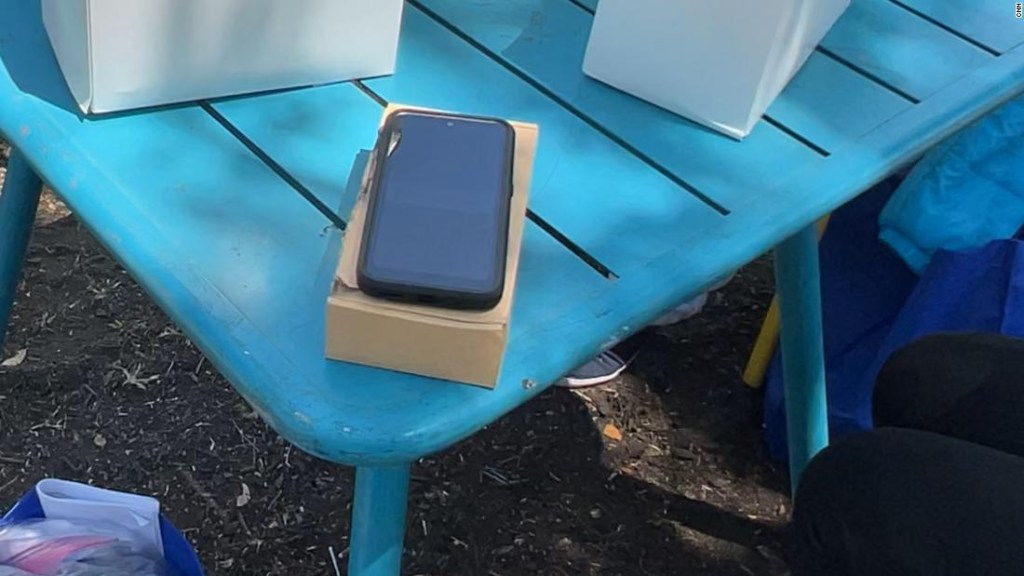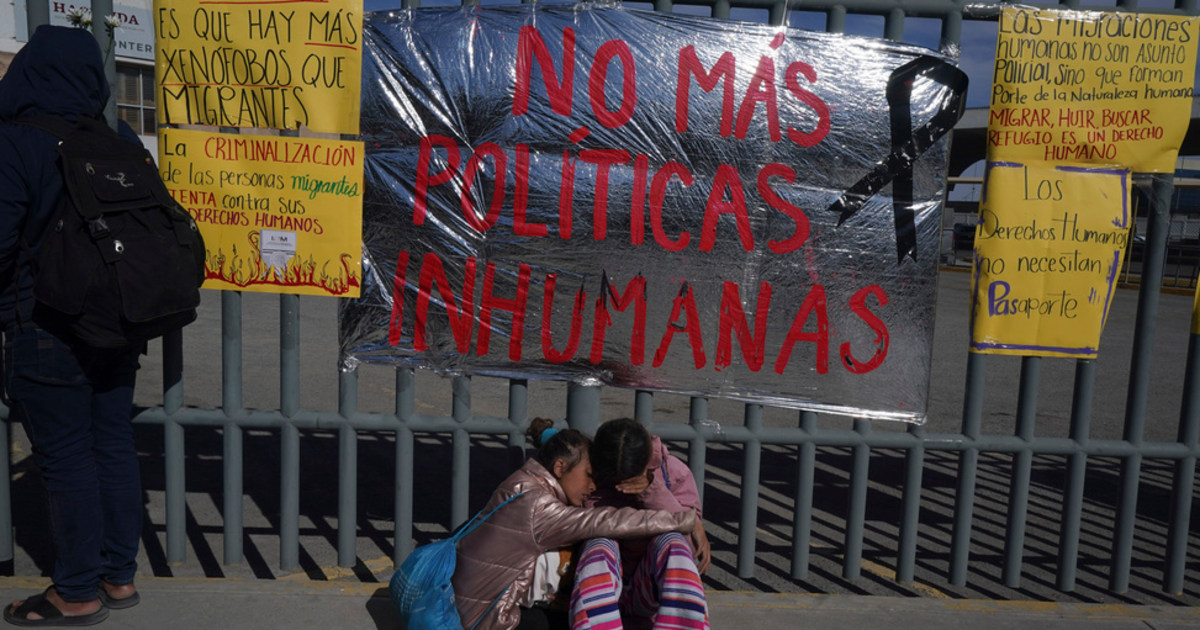This is how robot dogs would work on the US-Mexico border 1:56
(CNN) -
The sudden noise of a cell phone caused Joel to jump from his seat.
He ran to a purple backpack behind him and opened the front pocket.
An alarm sounded on the phone given to him by US immigration authorities and he knew he had to act fast.
He fumbled with the phone for several minutes, struggling to understand the app's English instructions and follow its rules for taking a selfie.
"Are they going to send me back to Cuba?" he asked, worried that he would be returned to the country he says he fled after facing police persecution.
Joel, who asked to be identified only by his first name to protect his safety, was one of several immigrants who recently spoke with CNN in San Antonio, Texas.
He is one of a growing number of Cubans crossing the US-Mexico border seeking asylum.
And the government-issued cell phone he was carrying shows that he, too, is part of another growing group.
Cubans are arriving in the United States in record numbers.
Traffickers take advantage of their exodus
Immigration and Customs Enforcement (ICE) monitors nearly a quarter of a million immigrants in a program that uses GPS-enabled ankle monitors, cell phones or an app known as SmartLINK, according to the most recent statistics. recent from the agency.
The Joe Biden administration has rapidly increased the number of people in this program, known as "alternatives to detention," or ATD.
advertising
It's unclear how many immigrants have been loaned phones as part of the program.
ICE has not released that data in its regular public updates about the program, and the agency did not respond to questions from CNN about it.
But lawyers and advocates working with immigrants told CNN that government-issued phones, which can only be used with the SmartLINK app and can't make calls or access the Internet, are becoming more common.
“We have seen a drastic, drastic increase in the use of this technology,” says Javier Hidalgo, an attorney with the Center for Education and Legal Services for Refugees and Immigrants (RAICES).
“This is an expansion of how the US Department of Homeland Security (DHS) defines detention,” he says, “and there are a lot of issues that go along with it.”
Officials argue that these forms of monitoring are an effective way to handle cases.
But critics on both sides of the immigration debate say the ATD program raises big questions that should concern all Americans.
The Department of Homeland Security, for its part, has defended and praised him.
Alternatives to detention have been mentioned as part of the administration's plan to lift Title 42, and DHS will ask Congress for millions of dollars to grow the program even further.
The risks experienced by those who seek the American dream 4:00
About 1,000 people a day enrolled in the program
Alternatives to detention are not new.
ICE's program officially began in 2004, and officers began using the SmartLINK app in 2018. To run it, the agency relies on BI Inc., a subsidiary of private prison company GEO Group.
Now the program expands, and fast.
It has more than doubled in size since President Biden took office, according to an analysis of government data by the Transactional Records Access Clearinghouse (TRAC) at Syracuse University.
"It continues to show a tremendous amount of growth," says TRAC researcher Austin Kocher.
And all of that growth, according to Kocher, can be attributed to the increasing use of SmartLINK, an app that requires users to submit photos of themselves as a form of verification with authorities.
Currently, more than 185,000 people are being monitored by SmartLINK, about three-quarters of those enrolled in the ATD program, ICE says.
That's a big increase from less than three years ago, according to Kocher's analysis, when SmartLINK monitored fewer than 6,000 people for ICE.
Between April and May, Kocher says, about 1,000 people a day were signing up for the program.
What is Title 42?
A border policy that allows rapid deportation and generates debate
How cell phones work
ICE claims that the use of SmartLINK and other alternatives to detention "effectively increases court appearance rates (and) compliance with release conditions."
Officials determine what level of supervision is required and what technology will be used on a case-by-case basis.
When migrants like Joel, who are selected for the program, are released, ICE says some are loaned devices loaded with SmartLINK installed, unless they have their own smartphones.
Government-issued phones cannot make calls or be used to access the internet, ICE says, beyond using the app for its intended purpose.
Immigrants who have their own devices are asked to download the app on their phones.
SmartLINK "uses facial recognition software to verify identity, GPS data point capture, push notifications and reminders, direct messaging with case officers and participants, and a database of search services," according to ICE. .
"Those who fail to report," says ICE, "are subject to arrest and possible deportation."
Joel told CNN that he currently must submit a photo to register weekly.
The first time he attempted to submit a photo, he received several errors and, at one point, an ominous warning: "two attempts left."
After four attempts, his photo was accepted and he received a notification that registration was complete.
"It scared me," he said.
"I can't go back to Cuba."
Joel tries to use a government-issued phone to check in with ICE during an interview with CNN's Rosa Flores.
CNN blacked out part of this image to protect the safety of the subject.
Hidalgo, who regularly works with immigrants seeking asylum, says many clients have recently reported receiving phones with the SmartLINK app installed.
But phones, he says, raise a lot of concerns.
Some immigrants, she says, have reported difficulty charging and turning on devices.
"There is a fear ... that people will lose their records just because of technology issues," he says.
ICE did not respond to a request for comment on these concerns.
GEO Group declined to comment and referred questions to ICE.
BI's website touts "hassle-free setup" and longer battery life for its mobile devices.
"Customers can easily comply with supervision terms," says an information sheet on the site, "without the hassle of app stores and traditional smartphone functionality and updates."
A section on alternatives to detention on GEO's website says that devices preloaded with SmartLINK are not smartphones, as they cannot browse the Internet, make calls, send or receive text messages, or access app stores.
The company says it's a myth that the app frequently malfunctions and causes immigrants to fail to register.
"An average of 88.4% of SmartLINK registrations have been successfully completed in the last five years," says GEO.
DHS has not seen a "significant decrease" in migrants at the US-Mexico border despite efforts, Mayorkas tells CNN.
Privacy is lost and private companies benefit, say immigrant rights advocates
Immigrant rights advocates argue that expanding the alternatives to detention program creates new problems and raises significant privacy concerns.
Several organizations (Mijente, Just Futures Law, and Community Justice Exchange) filed a lawsuit in April asking a judge to order ICE to disclose more information about how data obtained through SmartLINK is tracked, used, and shared.
The lawsuit denounces "constant and invasive surveillance" and says the program exacts a heavy price for immigrants enrolled in it.
The organizations argue that they first requested the information through a Freedom of Information Act request in September, and that ICE and DHS did not respond.
“Now we are in this new frontier of immigration enforcement, where digital surveillance plays a very important role and the type of information that ICE collects and the network that it launches is so large that the system looks completely different,” says Cinthya Rodriguez, organizer of Mijente.
Sejal Zota, co-founder and legal director of Just Futures Law, says she hopes the lawsuit answers questions about the program and what she and others call ICE's "digital prisons."
"It's not very clear to us what information ICE and BI collect about immigrants and how that information is or could be used," he explains.
"That lack of clarity raises red flags about people's privacy, future uses of this data, and the reach of this surveillance network."
A government-provided cell phone sits on a table in a park where recently released migrants have been gathering in San Antonio, Texas.
In the meantime, he says, the show is unnecessarily causing emotional damage to tens of thousands of people.
Some people enrolled in the program, she says, are told that their case manager can call them at any time on any given day, scaring them out of the house.
"Imagine an app, it can call you anytime, while you're at work, while you're cleaning someone's house. It makes weird sounds. It catches people's attention," says Zota.
ICE did not respond to CNN's request for comment on the lawsuit.
But in a May 23 court filing, the agency asked a judge to dismiss the case, saying the organizations' initial FOIA request did not sufficiently describe the records sought and that some of the information requested may be exempt from disclosure. .
Government attorneys also denied the lawsuit's allegations about the program and its impact.
ICE has said that it is "committed to protecting the privacy rights and civil rights and liberties of all participants" in the program, and that DHS conducted and approved a privacy review of the program.
GEO Group declined to comment and referred questions to ICE.
On its website, the company says that it complies with all federal privacy laws, that it does not conduct surveillance, and that all data and records collected under its contract with ICE are the property of the US government.
Conservative critics say freeing migrants provides the wrong incentive
The program has also been criticized by conservative critics, who say they worry it gives would-be immigrants more of an incentive to take their chances at the border.
"When you start handing out cell phones and say, 'We'll call you when we need to get in touch with you,' and then let them go on their merry way into the interior of the United States, that's just going to encourage more and more people to come," says Chris Chmielenski, deputy director of NumbersUSA, an organization that advocates for less immigration.
Instead, Chmielenski says, anyone who crosses the border illegally should be expelled from the country immediately.
"Then you don't have to deal with detention centers or alternatives to detention," he says.
The US Secretary of Homeland Security reiterates his request to migrants at the southern border: "Don't come"
During a recent hearing on the Department of Homeland Security's proposed 2023 budget, Rep. Jake LaTurner, R-Kansas, expressed dismay at plans to grow the ATD program.
"Do you really think that the mass release of those who cross our borders illegally doesn't send the wrong message to human traffickers, cartels and migrants?" he said.
"Isn't this yet another message from this administration that the United States will not enforce our immigration laws?"
“No, that is not the message at all,” National Security Secretary Alejandro Mayorkas replied.
"Individuals are in immigration enforcement proceedings. And if their claims for relief under United States law are unsuccessful, they are subject to removal. And the rate of appearance of individuals in our alternatives to detention program in fact, it has increased."
LaTurner wasn't convinced.
"This show, without a doubt," he said, "is another message that the borders are wide open. Go ahead."
Money for the program would be better spent elsewhere, some say
The rapid growth of the program shouldn't just concern those with ties to the immigration system, says Kocher, who is also a research assistant professor at Syracuse.
"This technology is expansive," he says.
"And it's not like this is going to stop with immigrants either. It could be anyone. It could have tickets pending in your city. It could be students suspended from school. Your employer could increasingly use this technology to track what you're doing on the job. worked".
Those who oppose the way US immigration authorities use technology often point out that tools initially put in place as part of immigration enforcement, such as border surveillance, may later end up expanding to other communities and applications.
Robot dogs could patrol the US-Mexico border
Kocher and other critics of the alternatives to detention program argue that the resources used to fund it could be better spent elsewhere.
This fiscal year's budget includes more than $440 million to fund the program.
And officials are requesting an additional $87 million for next year.
Immigrant rights advocates argue that providing legal representation to those with cases in immigration court would do even more to ensure people keep showing up.
Immigration restrictionists argue that resources would be better spent detaining and deporting more immigrants who are in the country illegally.
Neither of those options seems imminent.
But the push to expand alternatives to detention remains a clear priority.
ICE recently renewed a contract with another private company to provide 10,000 cell phones equipped with a facial recognition app for immigrant registration.
For his part, Joel says he plans to continue using the government-provided phone to check in every week.
He says that the persecution and police surveillance pushed him to flee Cuba.
And in the United States, he assures that he is doing everything possible to comply with the authorities so that they do not send him back.
It is worth it, he says, for the opportunity to live in a country where there is more freedom.
CNN's Priscilla Alvarez contributed to this report.
Immigrants in the US Immigration and Customs Enforcement









